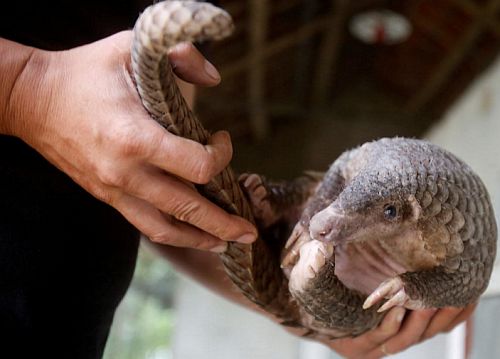TN, U'khand emerging as hotspots for pangolin trafficking
April 09, 2020 11:37

As pangolins come under the scanner as potential intermediate hosts of the novel coronavirus transferred from bats to humans, Indian wildlife conservationists warn that the states of Tamilnadu and Uttarakhand are emerging as the hotspots for the poaching of the endangered scaly anteater mammal. A recent study, published in the journal Cell, had placed pangolins as a natural reservoir of coronaviruses similar to SARS-CoV-2, the one behind the COVID-19 pandemic.
Another recent study had identified the presence of SARS-CoV-2 like viruses in Malayan pangolins smuggled into China to be sold in wet markets. In these markets, pangolins find demand both in food and traditional medicine, making them the most-commonly trafficked mammal.
"The discovery of multiple lineages of pangolin coronavirus and their similarity to SARS-CoV-2 suggests that pangolins should be considered as possible hosts in the emergence of novel coronaviruses and should be removed from wet markets to prevent zoonotic transmission," said Ved Kumar, a former wildlife conservationist with Wildlife Institute of India (WII), and founder of Maaty Biodiversity Conservation & Societal Research Organization in Uttarakhand.
Kumar told PTI that over the last decade, the demand for pangolin biological parts in China and other Southern Asian markets has increased due to their perceived medicinal properties, and value as a delicacy.
"So the poaching graph of this species continuously increases," he said. In their study, published in the journal Forensic Science International: Reports, Kumar and his team described the hotspots for pangolin trafficking in India. Based on their research, Kumar said between 2003 and 2014, states in Northeast India like Assam, Manipur, and Meghalaya were the hotspots for pangolin poaching in the country, adding that trafficking of the animals is also increasing in other places. "Now the trends change as poachers move towards Southern and Northern India. In the current scenario, Tamilnadu and Uttarakhand are the hotspots of poaching," he said, adding that dense forests with open boundaries and low forest staffs are factors linked to increased poaching in a region. Based on earlier studies from 2011 to 2013, analysing 51 pangolin seizures reported all over India, the scientists said 42 of them were made from the North-eastern states of India. Assessing another report of more than 91 pangolin seizures, reported between 2009-2017, they said the states of Manipur and Tamilnadu have had the highest number of documented confiscations.
The latest study by Kumar and his team indicated that between 2014 and 2018 most of the cases were reported from central, northern, and eastern Indian states where Maharashtra and Uttarakhand report the second highest position with 12 per cent of overall seizures. -- PTI
Image: A man holds a pangolin at a wild animal rescue center in Cuc Phuong, outside Hanoi, Vietnam. Pic: Reuters.





 © 2024 Rediff.com -
© 2024 Rediff.com -